
|  |

|  |
 A message in a massage - Veena Basavarajaiah, Bangalore e-mail: veenabasavarajaiah@gmail.com August 30, 2010 A professional dancer of today lives in a very demanding world. Apart from rigorous training and 6 to 8 hours of rehearsals, there is also the stress of a city life, travel, and pollution that adds to the burden on the body and the mind. It's a challenge to ensure a perfect balance amidst all the chaos. As dancers, we are prone to several repetitive stress injuries. To incorporate massage as part of one's training regime, rehearsal schedule or performance tour would help dancers rejuvenate themselves so that they may perform efficiently. If one would compare the body to an automobile, a massage would be like a regular oil change, wheel alignment and an overall service. Massage is the most effective technique to keep dancers going and to limit injury. Frequency of sessions varies according to the schedule and individual preference on a daily basis, and with others on a weekly or once in a year. 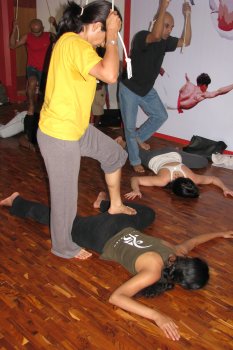 In India, Ayurvedic massages are extremely popular and effective and are also easily accessible to the general public. With a good balanced diet regime, yoga asanas and massage with oils prepared from medicinal plants and herbs, Ayurveda offers a perfect rejuvenating experience for all movement artistes. Kalaripayattu , a traditional martial art form of Kerala, incorporates knowledge of Ayurveda as an integral part of its training regime. A student begins everyday practice only after the application of gingelly oil on the body. Apart from this simple procedure, the training also incorporates three different kinds of massages focusing on general well being, flexibility and treatment of injuries. The Kalari foot massage is unique in its approach as the masseuse has to massage and integrate different strokes using his foot. The student receives the massage from the Gurukal and in the process is also taught how to give one. 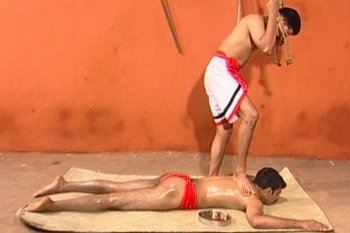 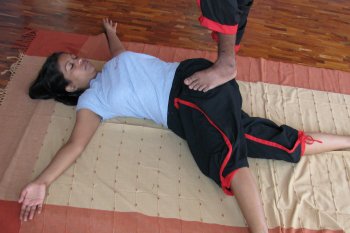 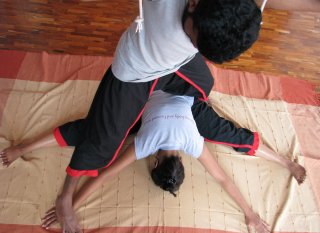 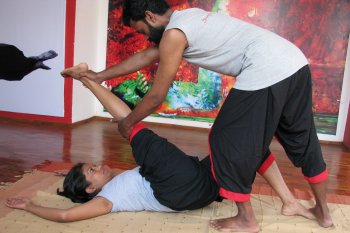 A regular massage is good for dancers who need general stress reduction therapy, rather than focusing on a specific group of muscles. Because it is a slower and lighter technique, it is possible for dancers to use short intervals of this massage before a performance or intense movement. A massage for flexibility is more vigorous and is considered a deep-tissue massage technique. It is normal to feel sore after a deep tissue massage as the pressure applied is intense and works in deeper layers of the muscles. 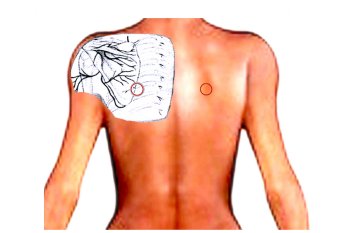 Massage for treatment vary based on the kind and degree of injuries. Slower and deeper types of massage can be used when dancers are relaxing after performance, or if a dancer needs to recover from injury. Marma massage, which can roughly be translated to neuromuscular massage, or pressure-point technique, is a unique technique of treatment in Kalari massage. With deep knowledge of Marmas, the masseuse will apply sustained pressure on certain trigger points in the body in order to relieve pain and soothe tight muscles. This massage is used to locate the injury (ligament, muscle, nerve, joint, bone etc) and analyze the extent of injury and apply pressure accordingly. A dancer is required to have a high level awareness of her tool of expression, the body. Along with good training, there is also a great responsibility of maintenance that comes with it. Every gesture of negligence finds its way through pain and injury reminding us that the body is the reason we are alive. A dancer has to be extremely disciplined about warm-ups before training and stretches to cool down after class/performance. Drinking lots of water and a balanced diet is extremely helpful to keep the body fit and strong. Good sleep and periodical massages will help a movement artist restore the body balance and help prevent injuries to ensure we dance beyond time. Kalari Academy of Performing Arts, a Bangalore based institution, conducts weekend training program on Marma Therapy and Kalari Massage where participants will be trained on techniques to gain flexibility, heal sports related injuries and improve general health. This workshop would be beneficial for professional dancers, athletes, martial artists, aerobic trainers, yoga practitioners and other physical training instructors. Kalari Academy aims at spreading the knowledge of Marmas used in Kalari treatment through this program. For more information contact: ranjanmullaratt@yahoo.com, phone: (080) – 25551772, mobile: 91-99451 55995 . 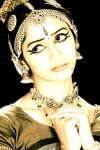 Veena Basavarajaiah is a Bangalore based solo dancer and choreographer who is trained in Bharatanatyam, Kalaripayattu, Ballet and Contemporary dance. She has worked with Shobana Jeyasingh Dance Company, Angika Dance Company, Attakkalari, Kalari Academy, Gati Forum, Nritarutya, Natyantharanga & Yana Lewis Dance Co. She has performed on various platforms across India, UK and Europe. She is the recipient of Special Mention Young Achievers Award in 2007 and also a paneled artist of the Indian council for Cultural relations. veenadance.com |